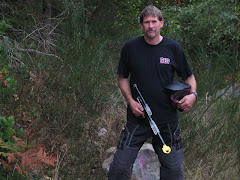A little while ago I wrote about a local paintball retail business that did not last too long due to some fundamental mismanagement (basically selling below the price they needed to cover overhead). If you missed it you can read it here: http://reiner-schafer.blogspot.com/2011/06/paintball-as-business.html
Any business needs to make have enough margin (the difference between the cost of goods sold and the selling price) to cover its overhead. A paintball field is no different. The difference between a paintball field and a retail paintball store is that a field's overhead can be manipulated a little more. Basically costs can be cut more than that of a retail store, but only to an extent, or at least it would seem. Most retail paintball stores are going to have similar overhead. They will all have rent, utilities, and sales staff (if it's a small retail store, the owner may be the only sales staff). The landlord (or mortgage lender) will also most likely make them have insurance as well.
Paintball fields seem to be able to cut more corners and shave overhead expenses. Many for instance don't have insurance (don't assume because they have a waiver that they also have insurance. I played at one field that used a waiver with an insurance company logo on it that I knew had stopped selling insurance years ago for instance). The number of staff a field uses can be cut. We try to have one staff member for every 10-15 players, but I know many fields were the number is more like 30-40 players. I have even known some fields to not have any staff on the field with players. Maintenance on fields is a fairly sizeable overhead, but can be almost eliminated if a field chooses to do so. if eliminated though, it means that the field will deteriorate more and more.
The point is that a professional well run field has overhead. A field that is run less professionally can choose to cut overhead. But cutting overhead also means cutting quality and services. When I hear players tell me that they can play at XYZ field for half the price, I wonder if the player realizes that he is more than likely only getting half the quality and services? I know if we were to cut our price in half, we would have to cut our services to the point where our customers would most likely not feel they received good value. Safety would be a concern with majorly reduced staff. Maintenance of our field would most likely need to be eliminated. Insurance would need to be cancelled. Lunch that is now included would no longer be provided.
Yes, players could play for half the cost, but we would lose the majority of our customers because they wouldn't want to take part in this new ghetto version of paintball. Overhead is real. Overhead needs to be paid for. Overhead is necessary to make the paintball experience for our customers enjoyable. Somehow that overhead needs to be paid for. Since the customers see the direct benefit of that overhead, I have no qualms about charging them for it and to be quite honest, our customers don't seem to have any qualms paying for it. There is no free lunch.
Stock Class
7 years ago


In running a PB field, how much does free/cheap labor come into play? A lot of players would be very eager to ref or spend a couple of days building/repairing bunkers/forts if it meant they got free/discounted admission. Unlike paint or gear, a field pass does cost anything directly. (Granted, you are giving up the income from the entries they would normally pay for, but with a field pass they may make up for it by playing more often.)
ReplyDeleteTrading labour for favours is a tricky deal. The biggest issue in my mind, other than the possible tax evasions, are the lack of Worker's Compensation. Maintenance at our field for instance most often involves the use of tools such as chainsaws, and tasks like climbing high ladders. There is the potential for serious injury. It really depends on the field owner. Some have no problem throwing caution to the wind while others will want to make sure everything is done above board.
ReplyDeleteCoupla things. Labor for play can be handled in the tax realm by determining the cash equivalent of labor and claiming that. It can be a good thing or a bad thing and mostly comes down to management on how that's handled.
ReplyDeleteNot that it will ever happen, but I'd really like to see some kind of field 'seal of approval'. A simple recognition that a facility meets the basic, minimal standards - proper staffing, proper safety, good overall business practices. Or even just a checklist that consumers can use for some kind of objective comparison.
Here's a real world analogy. Lots of players buy cheap paint, thinking that they are saving. If, on the other hand, they were taught to actually "shoot" their guns and bought more expensive paint that rewarded shooting skills, there is a good chance they'd save that way by wasting less paint on missed shots.
Same with fields. Often times, paying a bit more actually 'saves' the player by giving them a better experience.